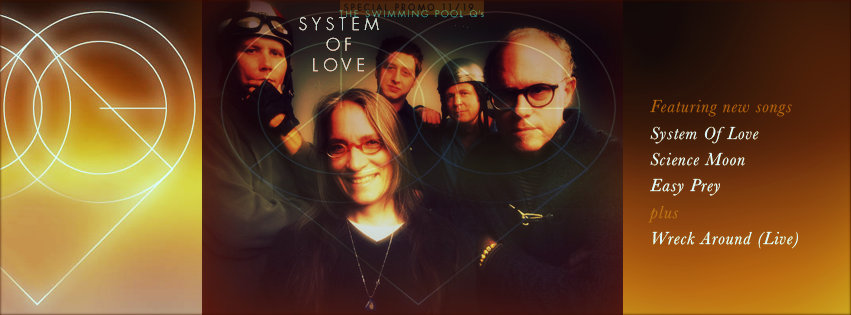System of Love EP by The Swimming Pool Q's- MP3 Album
Royal Academy Press > Hartford Advocate (1)
-
Hartford Advocate
The Swimming Pool Q'sRoyal Academy of Reality (Bar/None)
After re-familiarizing myself with the fun, Southern-fried rock of the Swimming Pool Q's on last year's reissue of The Deep End (DB Recs), I was not prepared for their brand new Royal Academy of Reality . To say they've taken a leap in direction, composition and execution is to say that the Hubbel Telescope is an improvement over a pair of binoculars. Of course, The Deep End was originally recorded in 1980 and became a touchstone for those who'd also developed a taste for the Qs' peers, like the Reivers, B-52s and Pylon. So, we're talking 23 years of honing chops.
But still …
Royal Academy of Reality is dense, lush, provocative and, well, lovely, which is not something you could say about classic early SPQ songs like "Rat Bait" and "Walk Like a Chicken." It reflects the restless spirit and intellect of Jeff Calder, the driving force behind the band and one of the brainiest people involved in any way, shape or form with rock music. He is also a walking encyclopedia of musical influences and erudition, and is as funny as Al Franken, to whom he now bears a passing resemblance (his liner notes to the reissued Deep End are a masterpiece of this lost art form).
The Royal Academy of Reality is rightfully described by him as "an immense undertaking." Think of it as Calder's Tubular Bells , broken into 20 seamless tracks built upon such themes as "the wheel of the sun in the vault of the sky," "hoodoo stars," love and loss. The big stuff.
While the humor of the band is still intact, it doesn't undercut the seriousness of compositions like the ethereal "Light Arriving Soon," "The Earth Makes Us Feel Things," "Sky Land," "The Radio in Memphis" and "Wheel of the Sun" (featuring Velvet Underground's Moe Tucker on drums). This is not to say that there aren't cuts that evoke the cosmic hilarity of their old stuff. The segue from "The Do What and the Who What" to "Yin Yang" sounds pleasantly like old times, and gives a hint of just how far they've come on the rest of the album.
The instrumentation alone required the skills of a veteran film director: sitars, violins, dulcimers, vibraphone, xylophone, saxophone, trumpet, harp, clavinet, myriad guitars, spacey electronics, atmospherics, chang, glockenspiel, mollusks and bongos. Assisting Calder are two of the original SPQs, Anne Richmond Boston, whose vocal skills have deepened from the days of "Little Misfit," and Bob Elsey, the inventive lead guitarist who learned his lessons well from Atlanta guitar master, Glenn Phillips. Marty Kearns and co-producer Phil Hadaway prove themselves eclectic team players, and Calder has his fingerprints on just about everything here (singing, playing, composing, co-producing). It's an astonishing accomplishment that may be so far out of left field that it gets lost in the vomitorium of pop culture. If it does, that would be a tragedy.
--Alan Bisbort






